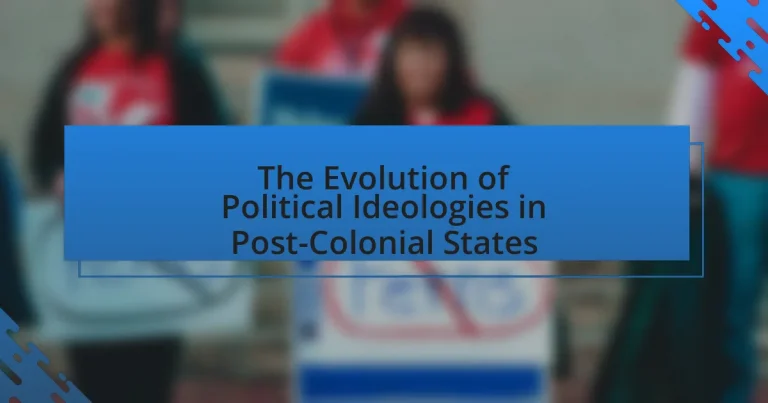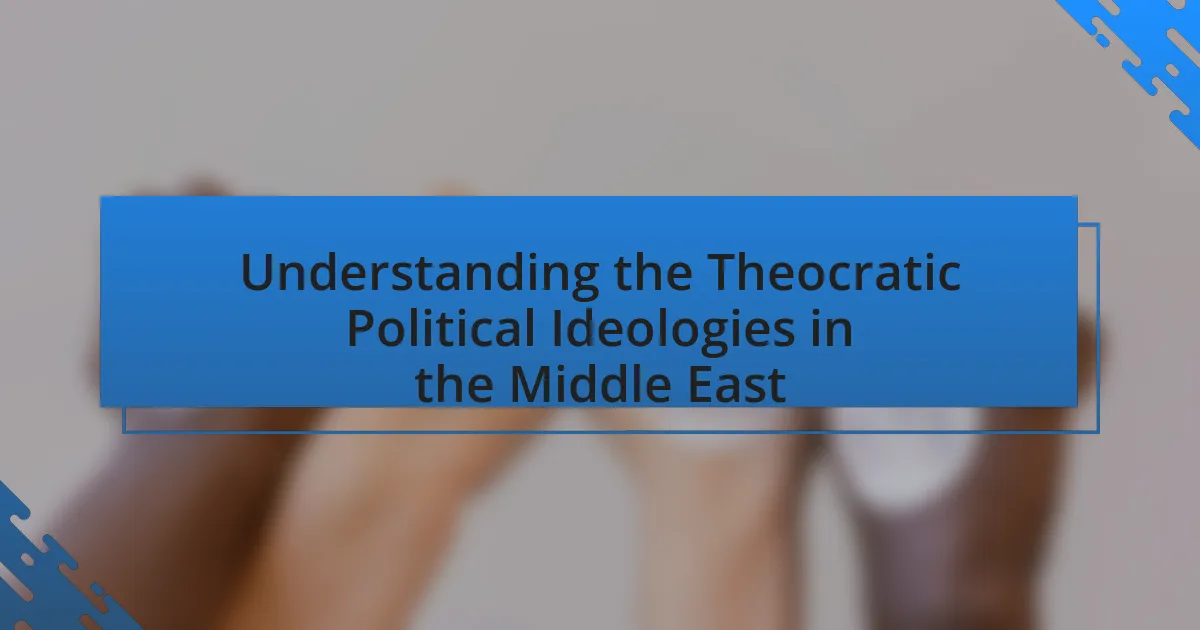The article examines the evolution of political ideologies in post-colonial states, focusing on how nationalism, socialism, and liberalism emerged as key frameworks for governance following independence from colonial rule. It explores the influence of colonial legacies on these ideologies, highlighting the role of cultural factors, indigenous beliefs, and language in shaping political thought. Additionally, the article discusses the impact of internal conflicts, economic challenges, and external influences on ideological development, while emphasizing the importance of understanding these dynamics for effective governance and policy-making in contemporary post-colonial contexts.

What are Political Ideologies in Post-Colonial States?
Political ideologies in post-colonial states encompass a range of beliefs and systems that emerged as nations sought to define their identity and governance after gaining independence from colonial rule. These ideologies often include nationalism, socialism, and liberalism, reflecting the diverse aspirations and challenges faced by these states. For instance, many post-colonial countries adopted nationalism as a unifying force to foster national identity and sovereignty, while others leaned towards socialism to address economic inequalities and promote social justice, as seen in countries like Cuba and Vietnam. Additionally, liberalism has gained traction in some regions, advocating for democratic governance and individual rights, exemplified by the political transitions in South Africa and India. The interplay of these ideologies is shaped by historical contexts, socio-economic conditions, and the legacies of colonialism, influencing the political landscape and policy-making in post-colonial states.
How did colonialism shape political ideologies in these states?
Colonialism significantly shaped political ideologies in post-colonial states by instilling a legacy of governance structures, economic systems, and social hierarchies that influenced nationalist movements and political thought. The imposition of colonial rule often led to the adoption of Western political concepts, such as democracy and liberalism, which were then adapted to local contexts. For instance, in India, the struggle for independence was heavily influenced by Western ideals of self-determination and civil rights, as seen in the writings of leaders like Mahatma Gandhi and Jawaharlal Nehru. Additionally, the arbitrary borders drawn by colonial powers created ethnic tensions that shaped nationalist ideologies, as seen in African states where colonial boundaries did not reflect ethnic divisions, leading to conflicts post-independence. This historical context illustrates how colonialism not only introduced new political ideas but also complicated existing social structures, ultimately shaping the political landscape of these states.
What are the key characteristics of political ideologies that emerged post-colonialism?
Key characteristics of political ideologies that emerged post-colonialism include nationalism, anti-imperialism, and social justice. Nationalism became prominent as newly independent states sought to establish their identity and sovereignty, often emphasizing cultural heritage and unity among diverse ethnic groups. Anti-imperialism arose as a reaction against colonial powers, advocating for self-determination and the rejection of foreign dominance. Social justice movements gained traction, focusing on addressing inequalities and promoting equitable distribution of resources, often influenced by Marxist and socialist principles. These ideologies were shaped by historical contexts, such as the struggles for independence in Africa and Asia during the mid-20th century, which highlighted the need for political frameworks that addressed the legacies of colonialism.
How did the legacy of colonial rule influence these ideologies?
The legacy of colonial rule significantly influenced political ideologies in post-colonial states by instilling a sense of nationalism and anti-colonial sentiment. This influence is evident as many newly independent nations adopted ideologies that emphasized self-determination and sovereignty, reacting against the oppressive structures established during colonialism. For instance, the rise of nationalism in countries like India and Algeria was directly linked to the experiences of colonial exploitation and the desire to reclaim cultural identity and political autonomy. Additionally, the imposition of Western political models during colonial rule led to the adaptation and sometimes rejection of these models in favor of indigenous governance systems, as seen in the emergence of socialism in various African nations. This adaptation was often a response to the failures of colonial governance, which left a legacy of economic disparity and social division, prompting leaders to seek alternative ideologies that addressed local needs and aspirations.
What role do cultural factors play in shaping political ideologies?
Cultural factors significantly influence the formation and evolution of political ideologies by shaping values, beliefs, and social norms within a society. For instance, in post-colonial states, cultural heritage and historical experiences often inform citizens’ perspectives on governance, justice, and authority. The legacy of colonialism can lead to a strong emphasis on nationalism and identity politics, as seen in countries like India, where cultural diversity has fostered various political movements that reflect regional identities and social justice issues. Additionally, cultural narratives around religion, ethnicity, and language can create distinct ideological frameworks, as evidenced by the rise of political parties in Africa that align with ethnic groups, such as the African National Congress in South Africa, which draws on cultural symbols and historical struggles against apartheid. These examples illustrate how cultural factors are integral to understanding the complexities of political ideologies in post-colonial contexts.
How do indigenous beliefs and practices influence political thought?
Indigenous beliefs and practices significantly influence political thought by shaping governance structures, community values, and social justice principles. These beliefs often emphasize collective ownership, environmental stewardship, and the importance of community consensus, which can lead to alternative political frameworks that prioritize communal well-being over individualism. For instance, many indigenous cultures advocate for a holistic relationship with nature, which informs policies on land use and environmental protection. This influence is evident in movements such as the Zapatista uprising in Mexico, where indigenous principles of autonomy and self-governance challenged neoliberal policies. Additionally, indigenous practices often promote participatory decision-making, which can inspire democratic reforms in post-colonial states, as seen in the incorporation of traditional councils in governance systems in countries like Bolivia.
What impact does language have on political ideology formation?
Language significantly influences political ideology formation by shaping how individuals and groups articulate their beliefs and values. The use of specific terminology can frame political issues in particular ways, affecting public perception and discourse. For instance, in post-colonial states, the adoption of indigenous languages in political communication can empower local identities and foster nationalism, as seen in countries like India, where regional languages have been used to mobilize support for various political movements. Furthermore, language can also serve as a tool for exclusion or inclusion, impacting who is able to participate in political dialogue. Research indicates that the language used in political rhetoric can reinforce existing power structures or challenge them, thereby playing a crucial role in the evolution of political ideologies.
How have political ideologies evolved over time in post-colonial states?
Political ideologies in post-colonial states have evolved significantly from initial anti-colonial nationalism to a diverse array of ideologies including socialism, liberalism, and religious fundamentalism. Initially, many post-colonial states embraced nationalism as a unifying ideology to gain independence from colonial powers, exemplified by leaders like Kwame Nkrumah in Ghana and Jawaharlal Nehru in India, who promoted national identity and self-determination. Over time, as these states faced challenges such as economic underdevelopment and political instability, some shifted towards socialism, seeking to address inequalities and promote state-led development, as seen in countries like Cuba and Algeria.
In the late 20th century, the rise of neoliberalism influenced many post-colonial states to adopt market-oriented reforms, leading to a resurgence of liberal ideologies focused on democracy and human rights, particularly in regions like Eastern Europe and parts of Africa. Additionally, the emergence of religious fundamentalism in some states, such as Iran and Afghanistan, introduced a new ideological dimension, emphasizing the role of religion in governance and society. This evolution reflects the complex interplay of historical, social, and economic factors that continue to shape political ideologies in post-colonial contexts.
What are the major phases of ideological evolution in these regions?
The major phases of ideological evolution in post-colonial states include nationalism, socialism, and neoliberalism. Initially, nationalism emerged as a dominant ideology, driven by the desire for independence and self-determination following colonial rule. This phase often involved the formation of national identities and the establishment of sovereign states, as seen in countries like India and Ghana during the mid-20th century.
Subsequently, many post-colonial states adopted socialism as a response to economic inequalities and the legacy of colonial exploitation. This phase was characterized by state-led development and the nationalization of key industries, exemplified by leaders such as Julius Nyerere in Tanzania and Fidel Castro in Cuba.
In recent decades, neoliberalism has gained prominence, emphasizing market-oriented reforms, privatization, and globalization. This shift reflects a broader trend towards economic liberalization and integration into the global economy, as observed in countries like Chile and India since the 1980s. Each phase represents a significant ideological transformation influenced by historical, social, and economic contexts.
How have global events influenced the evolution of these ideologies?
Global events have significantly influenced the evolution of political ideologies in post-colonial states by shaping national identities and governance structures. For instance, the Cold War led to the emergence of various ideologies as countries aligned with either the United States or the Soviet Union, resulting in the adoption of capitalism or socialism, respectively. The decolonization movements of the mid-20th century also prompted the development of nationalism, as newly independent states sought to assert their sovereignty and cultural identity. Additionally, global economic crises, such as the 2008 financial crisis, have led to a resurgence of populism and anti-establishment sentiments in many post-colonial nations, reflecting a shift in public trust towards traditional political ideologies. These events illustrate how external pressures and historical contexts have continuously reshaped the ideological landscape in post-colonial states.
What are the main political ideologies present in post-colonial states today?
The main political ideologies present in post-colonial states today include nationalism, socialism, and liberalism. Nationalism often emphasizes the importance of national identity and sovereignty, as seen in countries like India and Nigeria, where movements for independence were rooted in the desire to assert cultural and political autonomy. Socialism has influenced various post-colonial states, particularly in Latin America and parts of Africa, where leaders like Hugo Chávez in Venezuela and Julius Nyerere in Tanzania implemented socialist policies to address inequality and promote social welfare. Liberalism, advocating for democracy and individual rights, has gained traction in many post-colonial nations, particularly in regions like Southeast Asia, where countries such as Indonesia have embraced democratic reforms. These ideologies reflect the diverse historical contexts and socio-economic challenges faced by post-colonial states, shaping their political landscapes today.
What distinguishes socialism from nationalism in these contexts?
Socialism is distinguished from nationalism in post-colonial contexts primarily by its focus on economic equality and collective ownership, while nationalism emphasizes national identity and sovereignty. Socialism seeks to address class disparities and promote social welfare through state intervention and redistribution of resources, as seen in various post-colonial states that adopted socialist policies to combat colonial legacies of inequality. In contrast, nationalism often prioritizes the interests of a specific ethnic or cultural group, aiming to unify the nation against external influences, which can sometimes lead to exclusionary practices. Historical examples include the socialist policies implemented in countries like Cuba and Vietnam, which aimed to dismantle colonial structures, versus the nationalist movements in India and Kenya that focused on self-determination and cultural revival.
How do liberal and conservative ideologies manifest in post-colonial settings?
Liberal and conservative ideologies manifest in post-colonial settings through differing approaches to governance, social policies, and economic development. Liberals often advocate for democratic governance, individual rights, and social justice, emphasizing the need for reforms that address historical inequalities stemming from colonialism. For example, in India, the liberal Congress Party has historically pushed for policies aimed at reducing poverty and enhancing civil liberties. Conversely, conservatives tend to prioritize national sovereignty, cultural preservation, and traditional values, often resisting rapid social change. In countries like Uganda, conservative leaders have focused on maintaining cultural identity and stability, sometimes at the expense of progressive reforms. These ideological manifestations are shaped by the unique historical contexts of each post-colonial state, influencing their political landscapes and policy directions.

What challenges do post-colonial states face regarding political ideologies?
Post-colonial states face significant challenges regarding political ideologies, primarily due to the legacy of colonialism, which often leaves them with fragmented national identities and competing ideological frameworks. These states frequently struggle to establish a cohesive political identity that resonates with diverse ethnic and cultural groups, leading to internal conflicts and instability. For instance, in countries like Nigeria, the imposition of colonial borders has resulted in a complex interplay of ethnic nationalism and regionalism, complicating the development of a unified national ideology. Additionally, the influence of external powers and global capitalism can undermine local political ideologies, as seen in the economic policies imposed by international financial institutions that may not align with the needs of the local populace. This creates a tension between traditional values and modern political demands, making it difficult for post-colonial states to forge a stable and inclusive political landscape.
How do internal conflicts affect ideological development?
Internal conflicts significantly influence ideological development by creating a dynamic environment where competing beliefs and values emerge. In post-colonial states, these conflicts often arise from ethnic, religious, or socio-economic divisions, leading to a reevaluation of existing ideologies. For instance, the civil wars in countries like Rwanda and Sudan prompted shifts in national identity and governance ideologies, as groups sought to assert their narratives and power. This process can result in the emergence of new political movements or the radicalization of existing ones, as seen in the rise of ethnic nationalism in various African nations post-independence. Thus, internal conflicts act as catalysts for ideological transformation, reshaping political landscapes and influencing governance structures.
What role does ethnic diversity play in shaping political ideologies?
Ethnic diversity significantly influences the formation of political ideologies by introducing a variety of perspectives and interests that shape governance and policy-making. In post-colonial states, this diversity often leads to the emergence of ideologies that prioritize inclusivity and representation, as seen in countries like India, where multiple ethnic groups have necessitated a political framework that accommodates various cultural identities. Research indicates that ethnic diversity can foster both conflict and cooperation, impacting political stability and the development of democratic practices. For instance, the presence of diverse ethnic groups in a nation can lead to the establishment of coalition governments, as observed in South Africa’s post-apartheid era, where the African National Congress had to negotiate power-sharing arrangements to reflect the country’s demographic realities.
How do economic challenges influence ideological stability?
Economic challenges significantly influence ideological stability by creating conditions that can either reinforce or destabilize existing political beliefs. For instance, during economic downturns, citizens may become disillusioned with the ruling ideologies, leading to increased support for alternative political movements or ideologies. Historical examples include the Great Depression in the 1930s, which saw a rise in socialist and communist ideologies in various countries as people sought solutions to economic hardship. Additionally, economic inequality can exacerbate social tensions, prompting shifts in ideological alignment as marginalized groups advocate for change. Thus, economic challenges serve as a catalyst for ideological evolution, often resulting in a reevaluation of political beliefs and affiliations.
What external influences impact political ideologies in post-colonial states?
External influences that impact political ideologies in post-colonial states include globalization, foreign aid, international organizations, and transnational movements. Globalization facilitates the exchange of ideas and values, often leading to the adoption of liberal democratic principles, as seen in many African nations post-independence. Foreign aid from countries and organizations can shape governance models and policy priorities, influencing ideologies toward neoliberalism or social democracy, depending on the donor’s agenda. International organizations, such as the United Nations, promote human rights and democratic governance, affecting local political ideologies. Additionally, transnational movements, including environmental and social justice campaigns, can inspire local political activism and reshape ideologies to address contemporary global challenges.
How do international organizations shape political ideologies?
International organizations shape political ideologies by promoting specific values, norms, and frameworks that influence member states’ governance and policy-making. For instance, organizations like the United Nations advocate for democracy, human rights, and sustainable development, which can lead to the adoption of similar ideologies in post-colonial states. The World Bank and International Monetary Fund often condition financial assistance on the implementation of neoliberal economic policies, thereby embedding these ideologies into national frameworks. Historical examples include the influence of the European Union on Eastern European countries post-1990, where EU membership requirements led to the adoption of democratic governance and market-oriented reforms.
What is the impact of foreign intervention on local ideologies?
Foreign intervention significantly alters local ideologies by introducing external values and political frameworks that can reshape societal beliefs and governance structures. For instance, during the Cold War, U.S. and Soviet interventions in various countries led to the adoption of capitalism and communism, respectively, fundamentally changing local political ideologies. The imposition of foreign democratic ideals in nations like Iraq post-2003 has also shown how intervention can lead to a clash with existing cultural and religious beliefs, often resulting in resistance or hybrid ideologies. Such interventions can create a dependency on foreign powers, further complicating the evolution of authentic local ideologies.

How can understanding political ideologies in post-colonial states inform future governance?
Understanding political ideologies in post-colonial states can inform future governance by revealing how historical contexts shape contemporary political behavior and policy-making. For instance, many post-colonial nations grapple with legacies of colonialism, which influence their governance structures and citizen expectations. Analyzing ideologies such as nationalism, socialism, and liberalism within these contexts allows policymakers to address specific societal needs and historical grievances effectively. Research indicates that countries like India and Nigeria have adopted varying degrees of these ideologies to navigate their unique challenges, demonstrating that a nuanced understanding of political thought can lead to more effective governance strategies tailored to local realities.
What lessons can be learned from the evolution of these ideologies?
The evolution of political ideologies in post-colonial states teaches that adaptability and responsiveness to local contexts are crucial for ideological success. Historical examples, such as the shift from Marxist-Leninist ideologies in countries like Angola and Mozambique to more pragmatic approaches, illustrate how ideologies must evolve to address the unique socio-economic challenges faced by these nations. Additionally, the rise of nationalism in post-colonial contexts demonstrates the importance of cultural identity in shaping political thought, as seen in India’s emphasis on Hindu nationalism. These lessons highlight that ideologies must not only reflect historical legacies but also engage with contemporary realities to remain relevant and effective.
How can policymakers utilize historical insights for contemporary governance?
Policymakers can utilize historical insights for contemporary governance by analyzing past political ideologies and their outcomes to inform current decision-making. For instance, understanding the successes and failures of post-colonial governance models, such as those in India and Ghana, allows policymakers to identify effective strategies and avoid previous mistakes. Historical case studies reveal that inclusive governance and participatory democracy have led to more stable political environments, as seen in the democratic transitions of South Africa in the 1990s. By leveraging these insights, policymakers can craft policies that resonate with the socio-political context of their nations, ultimately fostering better governance and societal cohesion.
What strategies can be employed to foster ideological cohesion?
To foster ideological cohesion, strategies such as promoting inclusive dialogue, establishing shared narratives, and encouraging participatory governance can be employed. Inclusive dialogue allows diverse groups to express their views, fostering understanding and reducing polarization. Establishing shared narratives helps create a common identity and purpose, which is essential in post-colonial contexts where multiple ideologies may exist. Encouraging participatory governance ensures that citizens feel represented and invested in the political process, which can strengthen ideological alignment. Historical examples, such as South Africa’s Truth and Reconciliation Commission, demonstrate how these strategies can effectively unify disparate groups under a cohesive ideological framework.
What best practices can be adopted for promoting stable political ideologies?
Promoting stable political ideologies can be effectively achieved through inclusive governance, education, and civic engagement. Inclusive governance ensures that diverse voices are represented in decision-making processes, fostering a sense of belonging and reducing conflict. Education plays a crucial role by equipping citizens with critical thinking skills and knowledge about political systems, which can lead to informed participation. Civic engagement initiatives, such as community dialogues and participatory budgeting, empower citizens to actively contribute to political discourse and policy-making. Historical examples, such as the post-apartheid reconciliation efforts in South Africa, demonstrate that these practices can lead to greater political stability and social cohesion.
How can education play a role in shaping political consciousness?
Education plays a crucial role in shaping political consciousness by providing individuals with the knowledge and critical thinking skills necessary to engage with political systems. Through curricula that include history, political theory, and civic education, students learn about their rights, responsibilities, and the functioning of government. For instance, studies have shown that higher levels of education correlate with increased political participation and awareness, as educated individuals are more likely to vote and engage in civic activities. Additionally, education fosters an understanding of social justice and equity, which can motivate individuals to advocate for change in post-colonial contexts, where political ideologies are often influenced by historical injustices.
What community engagement strategies can enhance ideological understanding?
Community engagement strategies that can enhance ideological understanding include dialogue-based forums, participatory workshops, and collaborative projects. These strategies facilitate open communication and allow individuals from diverse ideological backgrounds to share perspectives, fostering mutual respect and comprehension. For instance, dialogue-based forums have been shown to reduce polarization by encouraging active listening and empathy among participants, as evidenced by studies conducted by the National Coalition for Dialogue & Deliberation, which highlight the effectiveness of structured conversations in bridging ideological divides. Additionally, participatory workshops that involve community members in decision-making processes can lead to a deeper understanding of differing viewpoints, as they promote active involvement and shared ownership of outcomes. Collaborative projects, such as community service initiatives, can also unite individuals around common goals, thereby enhancing ideological understanding through shared experiences and teamwork.





